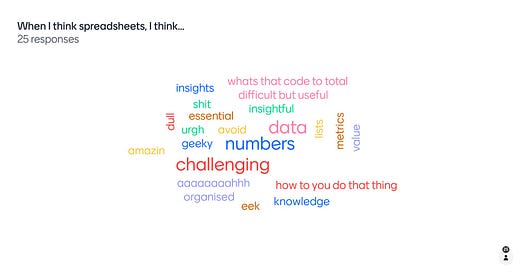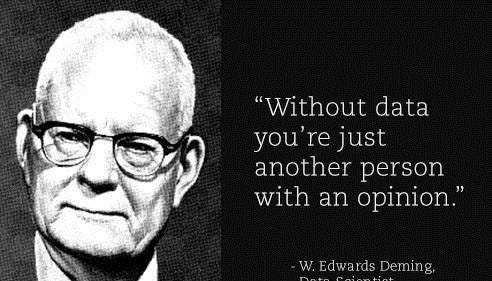Don't forget FoI... plus why our data literacy gap matters in a misinfo. world
Also: free Data Basics webinar tomorrow & a great data viz / storytelling podcast
Tomorrow - Data Basics (Free Webinar)
First up, a plug. After a successful first run of the series, the FREE #1 Facing Fears : Data Basics (45 mins) - aimed at not for profit comms pros - is running again tomorrow (Wed 27 March) at 12 noon to 12.45pm. Book here.
In the session we cover:
When we hear the word data, how do we feel?
Why is Data a Dirty Word in Comms?
Why Data Literacy Now Matters More in Comms
What’s Possible? Award-winning examples
Qualitative and Quantitative
Good Data and Bad Data
Data is Always Incomplete
Correlation doesn’t equal Causation
The importance of a Baseline
Outliers
And also now booking is a bonus one hour special - ‘Using AI for instant actionable insight from difficult data”. Places cost just £40 and will look at how Generative AI tools can be used to unlock crucial campaign and audience insights from PDFs and sprawling spreadsheets in a matter of seconds. Book here for that one.
Data Gurus in Top Chat on Telling Stories
Keeping me entertained on drives over the Yorkshire Pennines to see my mum recently has been Cole Nussbaum Knaflic talking with New Zealand-based data storyteller, Kat Greenbrook, about her new book, The Data Storyteller’s Handbook: How to create business impact using data storytelling. Take a listen.
What does this mean for fellow comms pros?
I’m seeing a growing interest in the practice and principles of good data viz among communications professionals.
I’m learning it’s not as simple as throwing in a load of numbers, creating some Excel pie charts or knocking up some pretty graphics in Canva.
I recently highlighted the random use of colour by my local council in communicating details of its 24/25 Budget, without thinking what the colours used might suggest to the audience.
Cole’s podcast series, and books like Kat’s and those of David McCandless (of Information Is Beautiful fame) help show us the way to do it better.
Harnessing Open Data, FoI and civil society data for campaign-boosting insights
I’ve been out and about on the road training this month, helping a Midlands communications team explore how to do more with data and explore the potential of generative AI. (If that sounds like something you and your team would benefit from, drop me a line!)
One of the pleasing outcomes was that the team started thinking past the availability (or sometimes unavailability) of internal data to inform campaigns, and started considering how wider civil society - and even FoI releases - might be utilised to inform comms planning and delivery.
As data literacy and skills have grown in journalism, FoI has become a key tool for revealing new angles - for example, this BBC story on student loans that had an eye-catching FoI-obtained top line.
What does this mean for fellow comms pros?
The next time you’re looking to answer key questions related to key campaigns or projects, try to go wider than just obvious low-hanging data. Use different sources to help better answer questions on the size of a problem you’re been asked to address, the baseline trends (rising, falling or static?), and who is most impacted (your target audience).
While your internal teams may be stacked out and/or sometimes unwilling to provide you with key data, it may be Open Data or even recent Freedom of Information requests (if you fall under the scheme) can give you what you need. Your organisation’s FoI responses may be published voluntarily on your web site, or you may find key data on What Do They Know?
If you are really floundering in the dark, an even bolder approach could be to ask a friend to make an FoI request for the data you need; assuming it falls within the scope of the legislation and you ask the right question, you should get what you need within 20 working days. But that’s a last resort that you would need to think carefully about.
Our misinformation response could be undermined by poor data literacy
Crisis comms expert (and my former boss!) Amanda Coleman delivered another excellent Under Pressure newsletter last week.
She wrote: "𝐀𝐬 𝐀𝐈 𝐬𝐩𝐫𝐞𝐚𝐝𝐬 𝐚𝐧𝐝 𝐦𝐨𝐯𝐞𝐬 𝐢𝐧𝐭𝐨 𝐚𝐬𝐩𝐞𝐜𝐭𝐬 𝐨𝐟 𝐨𝐮𝐫 𝐰𝐨𝐫𝐤𝐢𝐧𝐠 𝐥𝐢𝐯𝐞𝐬, 𝐞𝐧𝐬𝐮𝐫𝐢𝐧𝐠 𝐡𝐨𝐧𝐞𝐬𝐭𝐲 𝐚𝐧𝐝 𝐢𝐧𝐭𝐞𝐠𝐫𝐢𝐭𝐲 𝐢𝐧 𝐭𝐡𝐞 𝐢𝐧𝐟𝐨𝐫𝐦𝐚𝐭𝐢𝐨𝐧 𝐭𝐡𝐚𝐭 𝐢𝐬 𝐩𝐮𝐛𝐥𝐢𝐬𝐡𝐞𝐝 𝐢𝐬 𝐜𝐫𝐢𝐭𝐢𝐜𝐚𝐥. 𝐖𝐢𝐭𝐡𝐨𝐮𝐭 𝐢𝐭 𝐩𝐞𝐨𝐩𝐥𝐞 𝐰𝐢𝐥𝐥 𝐬𝐰𝐢𝐭𝐜𝐡 𝐨𝐟𝐟, 𝐭𝐮𝐫𝐧 𝐚𝐰𝐚𝐲 𝐚𝐧𝐝 𝐰𝐢𝐥𝐥 𝐥𝐨𝐨𝐤 𝐟𝐨𝐫 𝐚𝐥𝐭𝐞𝐫𝐧𝐚𝐭𝐢𝐯𝐞 𝐬𝐨𝐮𝐫𝐜𝐞𝐬 𝐨𝐟 𝐢𝐧𝐟𝐨𝐫𝐦𝐚𝐭𝐢𝐨𝐧".
For my part, I see data literacy playing an important part in the PR and comms response to disinformation and misinformation. The problem is that we know words like ‘spreadsheets’ can elicit a range of responses (taken from a recent Webinar we ran on the topic):
CoverageBook research in 2023 showed that over half (57%) of PR professionals who responded lacked confidence in their data literacy skills - and more worryingly, 44% stated they had previously presented a metric they did not fully understand.
What's the implication if you don't have the skills and confidence to sense check and interrogate a top line from survey results you are being asked to put out by your boss (even if that top line has been given to you in good faith)?
When AI spits out analysis and insight from a massive dataset to inform a major new campaign (see the forthcoming Webinar above), have you or your team got the confidence and ability to sense-check and verify it?
And how are you going to respond when a data journalist - who are increasing in number by the way - uses your own data to reveal a negative story. The data they are using might be incomplete or they may have made a basic error in the analysis - but if you 'don't do spreadsheets', you might miss the chance to kill it.
Also: the Government has been repeatedly ticked off by the UK Statistics Authority (UKSA) for dodgy data and misleading graphs - it even said Rishi Sunak’s use of stats “may have undermined trust in the government’s use of statistics and quantitative analysis in this area”
We've also seen recent media coverage of why official NHS waiting list figures don't tell the whole story.
As Amanda says, honesty and integrity is so important. Without the confidence and skills to sniff out statistical inaccuracies and mistakes in our own comms, we haven't got a hope of limiting the damage from bad actors - you can't have 'good' misinformation and 'bad' misinformation.
In a data-driven, AI-infused world, it's simply no longer enough for comms and PR professionals to say 'I do words, not numbers'.
Say hello in April and May
Whetstone Communications is proud to be a sponsor of the (SOLD OUT) comms2point0 UnAwards Masterclass in Birmingham in April, on what promises to be a brilliant day of sharing and learning from the 2023 winners - including Best Use of Data winner Buckinghamshire Council.
And we’re also delighted to be joining the Orlo Tour in Glasgow (May) and Manchester (July). Thanks to the team there for inviting me along for what promises to be two brilliant events.
If you’re at either of those events, do come and say hello.
Data Communications Chronicles is written by Alex Waddington, founder of Whetstone Communications, which helps public sector and not for profit comms teams do more - and deliver better - using data. Drop me a line at alex@whetstonecomms.com.





